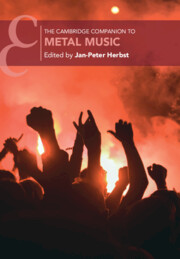Book contents
- The Cambridge Companion to Metal Music
- Cambridge Companions to Music
- The Cambridge Companion to Metal Music
- Copyright page
- Contents
- Figures
- Tables
- Notes on Contributors
- 1 Introduction
- 2 Get Your Double Kicks on Route 666
- Part I Metal, Technology and Practice
- Part II Metal and History
- 7 Mesopotamian Metal
- 8 Sparta and Metal Music’s Reception of Ancient History
- 9 Viking Metal
- Part III Metal and Identity
- Part IV Metal Activities
- Part V Modern Metal Genres
- Part VI Global Metal
- Select Academic Bibliography
- Select Journalistic Bibliography
- Index
8 - Sparta and Metal Music’s Reception of Ancient History
from Part II - Metal and History
Published online by Cambridge University Press: 31 August 2023
- The Cambridge Companion to Metal Music
- Cambridge Companions to Music
- The Cambridge Companion to Metal Music
- Copyright page
- Contents
- Figures
- Tables
- Notes on Contributors
- 1 Introduction
- 2 Get Your Double Kicks on Route 666
- Part I Metal, Technology and Practice
- Part II Metal and History
- 7 Mesopotamian Metal
- 8 Sparta and Metal Music’s Reception of Ancient History
- 9 Viking Metal
- Part III Metal and Identity
- Part IV Metal Activities
- Part V Modern Metal Genres
- Part VI Global Metal
- Select Academic Bibliography
- Select Journalistic Bibliography
- Index
Summary
This chapter focuses on ancient Sparta as a representative case for the general reception of classical antiquity in heavy metal music. The Spartans are the basis of songs and albums by dozens of bands across the globe: their last stand at Thermopylae is the most popular ancient battle in metal music, and their king Leonidas is one of the most popular ancient figures. Their appropriation by metal bands is a product of their rise in popularity in popular culture since the premiere of the 2006 film 300, and as in pop-culture, their appeal resonates with political and nationalistic agendas, especially of Greek bands. Sparta’s wide appeal harmonises with metal’s core ethos of hypermasculinity, the liberation of animal instincts and the disruption of systems of conformity and control. As with other topics from the classical world, heavy metal music takes the Spartans from both ancient sources and modern media and remakes them in the image of its own counterculture, that of the few standing defiant against the many.
Keywords
- Type
- Chapter
- Information
- The Cambridge Companion to Metal Music , pp. 99 - 113Publisher: Cambridge University PressPrint publication year: 2023

